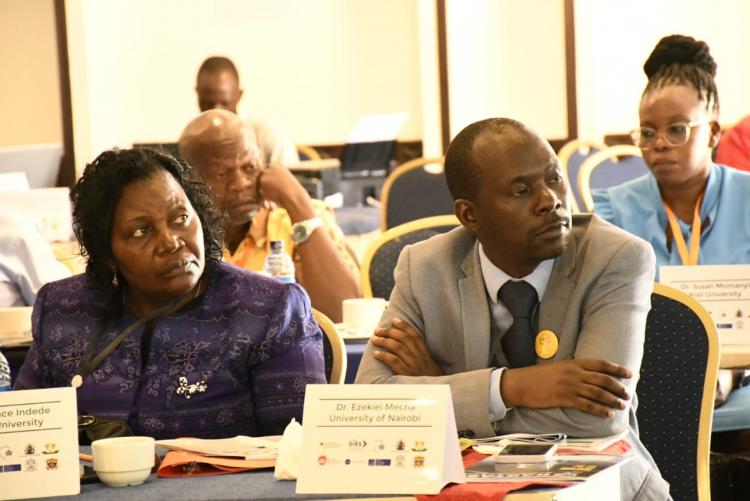In a landmark event for East African higher education, the University of Nairobi, Maseno University, and Dedan Kimathi University of Technology joined forces with international experts to explore the transformative potential of Collaborative Online International Learning (COIL) and virtual exchanges. This groundbreaking workshop, the first of its kind in the region, brought together 17 universities from Kenya and beyond to prioritize these innovative approaches to internationalization at home.
Led by renowned COIL expert Dr. Ezekiel Onyonka Mecha, the workshop provided a platform for academics to share experiences, learn best practices, and acquire the skills needed to implement COIL in their teaching. Dr. Mecha emphasized the critical role of internationalization in breaking down silos and fostering collaboration, citing the University of Nairobi's successful partnership with Thomas More University of Applied Sciences in Belgium as a shining example. This partnership has connected over 150 students across continents, enabling them to learn together, break down geographical barriers, and develop valuable cross-cultural skills.
The workshop's significance was further amplified by the participation of esteemed international and regional experts like Prof. Marcus Hope and Prof. Julius Maiyo, who offered valuable insights into navigating the landscape of international collaboration. Organized under the DIES programme's National Multiplication Trainings, the workshop equipped participants with practical tools and knowledge through in-depth sessions on COIL, e-learning, and virtual technology. This empowers them to leverage online platforms and international collaborations to enhance the quality of education and foster global connections within their institutions.
Prof. Leonida Ag. DVC Academic Affairs representing the Vice-Chancellor, Prof. Kiama, echoed the workshop's significance, highlighting the transformative power of educational exchange in bridging cultural divides and fostering global understanding. This resonated with participants, leaving them not only equipped with new skills but also committed to advocating for internationalization within their own institutions.
The workshop also addressed the challenges and opportunities facing internationalization in Kenya. The Director Corporate Affairs Mr Orindi who is also in charge of International Office at UoN noted While government policies aim to be conducive, certain aspects create unintended barriers. Additionally, resource allocation falls short of aspirations, with research funding at 2% of GDP and dedicated internationalization funding deemed insufficient. Despite these challenges, the University of Nairobi's strategic plan acknowledges the need for resource mobilization and capacity building to achieve its internationalization goals.
The University of Nairobi (UoN) demonstrates an unwavering commitment to fostering internationalization both at home and abroad, aiming to cultivate a diverse and inclusive academic environment while enhancing its global footprint. With a vibrant community comprising 1,500 international students, 95 international staff members, and over 1,000 international partnerships, UoN's internationalization strategy is multifaceted. It prioritizes goals such as promoting diversity, attracting global talent, increasing visibility in scientific publications, and creating local and international impact through strategic partnerships and research endeavors. Key elements of this strategy include internationalizing the curriculum and pedagogy through initiatives like double degree programs, joint projects, and the integration of technology in education delivery. Moreover, UoN enriches students' experiences through cultural activities, special orientation, safe accommodations, scholarships, exchange programs, and international internships, ensuring holistic development and enhancing graduate employability. Collaborations with renowned institutions globally, including those in the EU, China, Japan, and North America, further amplify UoN's internationalization efforts, facilitating knowledge exchange and fostering a dynamic learning environment for its students and staff alike.
The workshop served as a platform to explore the application of COIL and virtual exchanges, demonstrating how these tools can enable geographically distant students and staff to develop core competencies and skills for internationalization. It also explored the potential of combining online education with international collaborations and partnerships, highlighting their critical role in a post-COVID world where physical mobility remains restricted.
By equipping participants with the foundational understanding and competencies to implement COIL and virtual exchanges, the workshop marks a significant step forward for Kenyan universities. This commitment to innovative approaches paves the way for a more connected and vibrant academic community, contributing to a future where knowledge and understanding transcend borders.
- Log in to post comments

